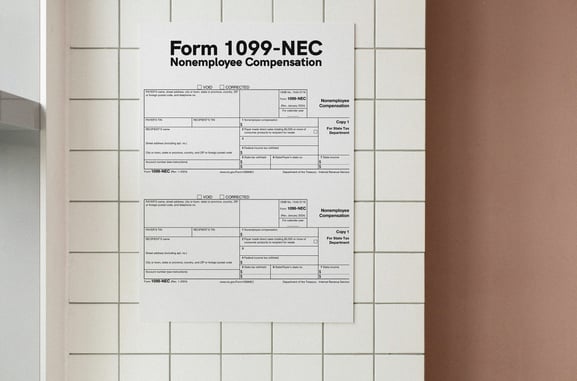
Latest Article: What is a Sovereign Wealth Fund and Why is America Creating One?
2024 Guide to 1099s: What is a 1099? What is Form 1099 Used For?
Learn about what a Form 1099 is, what it's used for, who needs to receive one, and who needs to provide one. Learn what a 1099 NEC is, what a 1099 MISC is, and more.
TAXACCOUNTING
David Kindness, CPA
7/16/2024



2024 Guide to 1099s: What is a 1099? What is Form 1099 Used For?
Updated on July 15, 2024
Written by David Kindness, CPA
Why you can trust Your Creative CPA
Our content is written, edited, or both by industry experts who are creative entrepreneurs just like you. Learn more.
Managing your income and taxes can be confusing, especially when you're running a creative business, working with clients, managing projects, and more. There are dozens of tax topics that creative business owners need to learn about, and 1099 forms are one of the most important because, for many business owners, they're used to report the income they receive from their work.
But learning about tax topics like 1099s can feel like a confusing distraction from your business goals. If you're curious about what a 1099 is, what kind of income 1099 forms report, who gets them, and what you're supposed to do with them, then read on below. By the end of this article, you'll be able to collect and manage your 1099s confidently and knowledgeably.
Fast Facts About Form 1099:
A 1099 form reports the income you received from freelance or contract work you performed during the year.
There are different types of 1099s for different types of income.
Businesses need to file a 1099 for anyone they paid $600 or more in a year (with some exceptions).
The recipient of the 1099 uses it to report their income on their tax return.
What is a 1099?
A 1099 form is an official document used by the Internal Revenue Service (IRS) to report income paid to someone who isn't a regular employee. This includes independent contractors and freelancers who generally work with multiple clients. 1099s can also be given to prize winners, investors, lottery winners, and more to report their earnings and winnings.
Basically, if you perform work as an independent contractor - as many creatives do - then you'll likely receive a 1099 each year from the various jobs you worked. Similarly, if you run a business and pay someone for their services and they aren't your employee, then you'll likely need to file a 1099 for them.
Who Receives a 1099?
Any non-employee worker who gets paid $600 or more in a year will receive a 1099 form from the company or individual they performed the work for. Non-employee workers can include independent contractors, freelancers, consultants, and anyone else who gets paid to perform a service as a contractor rather than as a regular employee.
Companies that hire and pay contractors must file a copy of the appropriate Form 1099 (usually Form 1099-NEC) with the IRS, and they must also send a copy to the contractor by January 31st of the following year. This gives individuals who receive Form 1099 enough time to report their information on their individual Form 1040 before the due date, which is typically April 15th.
What Do You Do With a 1099?
If you receive a 1099 form, you'll need to use the information on it to report the income on your tax return. The form will show the amount of income you received and the tax identification number, which is either a social security number (SSN) or employer identification number (EIN) of the business that paid you. Even after you fill out and submit your tax return, you should keep your 1099s for your tax records.
"1099s are one of the most important tax documents for most creative business owners. They report the income you receive from the work you perform as an independent contractor, which you'll use to prepare your annual income tax return."


Types of 1099 Forms and What To Do With Them
There are several different types of 1099 forms, and while they all look the same, they each report a specific kind of income that 1099 recipients need to be aware of and include on their Form 1040 tax return. The most common you could encounter are Form 1099-NEC, 1099-MISC, 1099-DIV, 1099-INT, and 1099-R. Read on below to learn more about each of these forms.
Form 1099 NEC
Form 1099-NEC, also known as the "Nonemployee Compensation" form, is the most common 1099 form that independent contractors will receive from 2023 onwards.
This form is used to report payments of $600 or more to independent contractors who perform services for clients.
Form 1099 is given to contractors in the same way that Form W-2 is given to employees, reporting income paid for work performed.
Businesses that hire and pay contractors must file a copy of Form 1099-NEC with the IRS and send a copy to the contractor by January 31st of the following year.
Form 1099-NEC replaced Form 1099-MISC as the primary Form 1099 given to contractors. As a result, you may have used Form 1099-MISC to file your taxes prior to 2020.
Form 1099 MISC
Form 1099-MISC, also known as the "Miscellaneous Information" form, is one of the most common types of 1099s.
This form reports miscellaneous income payments of $600 or more for items such as rent, royalties, or payments to attorneys.
The recipient uses the information on Form 1099-MISC to fill out their report income on their Form 1040 tax return.
Form 1099-MISC was the primary form given to contractors prior to 2020. As a result, you may have used Form 1099-MISC to file your taxes before 2020, but you will most likely have received Form 1099-NEC for tax year 2020 and later.
Form 1099 DIV
Form 1099-DIV, also known as the "Dividends and Distributions" form, is used to report dividend income to investors.
You'll receive a Form 1099-DIV if you earned dividends from stocks, mutual funds, or other investments.
The form shows the amount of dividends you received, as well as any taxes withheld.
You can use the information on Form 1099-DIV to report your dividend income on your Form 1040 tax return.
If you have dividend income from multiple investments then you may receive what's known as a brokerage statement from your bank or investment institution instead of individual 1099 DIV forms. Brokerage statements report earnings from multiple investments all in the same place.
Form 1099 INT
Form 1099-INT, also known as the "Interest Income" form, is used to report interest income to investors.
You'll receive a Form 1099-INT if you earned interest income on savings accounts, bonds, or other investments held at a bank or financial institution.
The form shows the total amount of interest you earned in the year and any federal income tax withheld by the bank or investment institution.
Use the information on Form 1099-INT to report your interest income on your Form 1040 tax return for the year.
Form 1099 R
Form 1099-R, also known as the "Distributions From Pensions, Annuities, Retirement or Profit-Sharing Plans, IRAs, Insurance Contracts, etc." form, is used to report retirement income to retirement account holders.
You'll receive a Form 1099-R if you took a distribution from a retirement account, such as a pension, IRA, or 401(k) during the year.
The form will show the amount of money you withdrew from the account, as well as any federal income tax withheld.
You may have to pay taxes on some or all of the money you withdraw from your retirement account. The tax treatment of retirement distributions can be complex, so consult with a tax advisor if you have any questions.
Conclusion
Managing taxes can be complex and confusing, especially when you'd much rather focus on your creative business and not on legalese and tax terminology. But because 1099s are a significant aspect of many creative businesses, understanding them can make things a lot easier.
By understanding the types of 1099s discussed above, and knowing what types of income they report, who receives them, and what to do with them, you can save yourself time and frustration come tax time.
Frequently Asked Questions (FAQs)
What is the difference between a 1099-MISC and a 1099-NEC?
The main difference between a 1099-MISC and a 1099-NEC is specific to payments made for services. A 1099-MISC is used for reporting various types of miscellaneous income, including rent, royalties, and payments to attorneys. Since 2020, a 1099-NEC is used specifically to report payments of $600 or more made to independent contractors and vendors for services provided in the course of your business.
What if I don't receive a 1099 form that I should have?
If you believe you earned $600 or more from a business and didn't receive a 1099 form, you can still report the income on your tax return. Contact the business directly to request a copy of the form. You can also file Form 4852, Substitute for Form 1099-MISC or 1099-NEC, with your tax return to report the income.
Do I need to file a 1099 for myself?
No, you don't need to file a 1099 for yourself, even if you are a sole proprietor. 1099 forms are used to report income paid to others who aren't regular employees.
What if I lose my 1099 form?
If you lose your 1099 form, you can request a copy from the payer who issued it. You can also usually access your 1099 forms online through your account with the bank or financial institution that provided the form.
Can I file 1099 forms electronically?
Yes, you can file 1099 forms electronically through the IRS FIRE system. This can save you time and paperwork compared to filing paper forms. However, there may be fees associated with electronic filing.
Do I need to file a 1099 for payments under $600?
Generally, you don't need to file a 1099 for payments under $600. However, there are some exceptions to this rule. For example, you must file a 1099-K for payments made through a third-party network for goods and services, regardless of the amount.
Disclaimer: the information provided in this article is for educational purposes only and does not constitute tax, accounting, investing, legal, or financial advice. The information in this article does not take into account your unique financial or business situation or goals, and YCCPA cannot be responsible for reader's financial decision-making. YCCPA's goal is to educate and support you on your creative business journey.
Written by David Kindness, CPA
David is a CPA (Certified Public Accountant) and professional photographer, videographer, and designer based in San Diego, California. Learn more.




supported by ads
Your Creative CPA is supported by the ads you see in our articles and guides.
These ads help us help creatives like you.

financial wisdom for creatives, by creatives
Created by David Kindness
Copyright 2025 Terms






